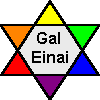Bnai Noach Questions Composite The following are answers to Bnai Noach on the subject of their religious observance. Bnai Noach Brachot Q: What blessing should Bnai Noach recite over food? A: "Blessed art Thou, O' G-d of Israel, Master of the universe Who...extracts bread from the earth, or creates fruits, vegetables, etc. according to the food being eaten. Q: Should a Ben Noach undergo circumcision? A: In a Jew, circumcision awakens the power of self sacrifice, which is above reason and knowledge. There is no reason for a non-Jew to be circumcised, unless it is part of his conversion to Judaism. Circumcision does weaken the Animal Soul. Q: Should Bnai Noach wear a head covering? A: If covering your head helps you to feel G-d's Presence above you and to accept His heavenly yoke, then it is a positive thing to do.
Q: I am a Ben Noach of marriageable age. What qualities should I look for in my potential marriage partner? Is there a special marriage ceremony for Bnai Noach? A: One of the mitzvot of Bnai Noach is loyalty in marriage. It is important that the woman that you choose to marry should also desire to live in loyalty, according to the 7 Noahide commandments. In the marriage ceremony it is advisable to express this concept, and to make a covenant of loyalty to one another, and also with G-d. The covenant with G-d should express the intention of the couple to keep the 7 mitzvot, and to help the Jewish people achieve their goal to bring redemption to the entire world with the coming of Mashiach. The marriage ceremony is certainly a holy event, and we actually learn from non-Jews that G-d forgives the couple all of their sins at this juncture. A Jewish rabbi can be present at the wedding. He can explain all of the above, and can make a blessing to G-d as well as bless the couple that they should merit to live a happy and fulfilling life together as they continue to grow close to G-d and His Torah.
Bnai Noach and the World to Come Q: Do Bnai Noach have a share in the World to Come? A: The Sages and the Rambam state that Righteous Gentiles have a share in the World to Come.
Q: What prayers are recommended for Bnai Noach? A: The main prayers for Bnai Noach can be found in Psalms, particularly the psalms that are appropriate for every human being as G-d's creation. It is also important to pray from your heart, in your own words. Pray about every detail in your personal life for which you seek G-d's guiding hand. Pray to G-d that all of humanity will recognize the truth of the Torah of Moshe, and will come close to G-d and to observance of the mitzvot of Bnai Noach. This will hasten the true and complete redemption by Mashiach, may it be speedily in our days! In the morning say Psalm 15. In the afternoon, Psalm 23, and in the evening Psalm 121.
Q: What parts of the Torah should Bnai Noach study? A: The parts of the Torah appropriate for Bnai Noach include the revealed parts of the Torah, which are the laws that apply to Bnai Noach, and the hidden parts of the Torah, meditation on G-d's Imminence and Divine Providence.
Q: What parts of the Tanya are recommended for Bnai Noach? A: For study of the Tanya, it is advisable for you to study in the Sha'ar hayichud v'haemunah the section on G-d's continual recreation of the world, as well as Igeret Hakodesh on tzedakah, (charity) as well as part 1 on simcha (joy) in chapter 26 as well as the discussion on love and fear of G-d in chapters 41-50. Q: What Torah stories are recommended for Bnai Noach to teach their children? A: Teach your children all of the stories in Genesis, as well as the books of Joshua and Judges.
|
